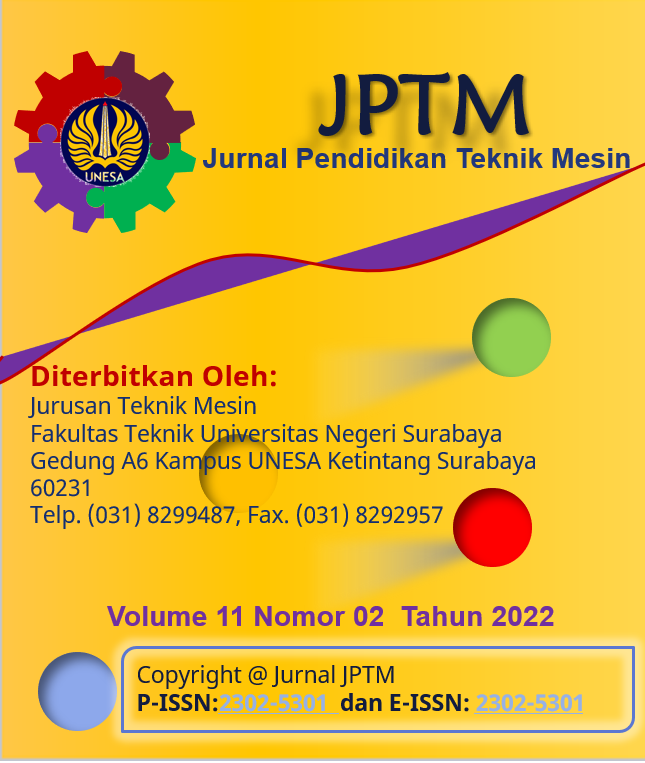IMPLEMENTASI PROJECT BASED LEARNING PADA MATA PELAJARAN PEMELIHARAAN CHASIS DAN PEMINDAH TENAGA UNTUK MENINGKATKAN KOMPETENSI SISWA KELAS XI SMK RADEN PATAH KOTA MOJOKERJO
Keywords:
Model pembelajaran, project based learning, peningkatan hasil belajarAbstract
Abstract
Learning models that are based on a teacher center such as Project Based Learning are important to support the development of education, especially in vocational education. The purpose of this study is to analyze the results of student learning mastery while implementing learning using Project Based Learning. This type of research is carried out using a form of classroom action research to compare direct instruction with direct instruction (DI) and project based learning. Meanwhile, this research model uses Kurt Lewin's model. The results of the implementation of Project Based Learning at Raden Patah Vocational School, Mojokerto City showed that in the first cycle, the percentage of class learning completeness was 89% and the average value was 80. In the second cycle, the average value was found to be 79 and the percentage of results obtained. completeness of class learning by 84%. It was concluded that the highest increase in student learning outcomes occurred in the first cycle of 89%. After the implementation of this learning model, the percentage of completeness of student learning outcomes increased by 47% compared to the previous learning model.
Keywords: Learning model, project based learning, improvement of learning outcomes.
Downloads
References
Bloom, Benjamin S., et al. 1956. Taxonomy of Educational Objective The Classification of Educational Goals, Hanbook I Cognitive Domain. New York: Longmans, Green and Co.
Fathurahman, Muhammad. (2017). Belajar & Pembelajaran Modern; Konsep Dasar, Inovasi dam Teori Pembelajaran. Yogyakarta: Garudhawaca.
Hamalik, Oemar. 2013. Kurikulum Dan Pembelajaran Mengajar. Jakarta: PT Bumi Aksara.
Hamdayama, Jumanta. (2016). Metodologi Pengajaran. Jakarta: Bumi Aksara.
Khoiruddin & Djoko. 2018. Penerapan Model Pembelajaran Project Based Learning (PjBL) Untuk Meningkatkan Aktivitas Dan Hasil Belajar Siswa Pada Kompetensi Dasar Aksi Dan Reaksi Gaya SMK Negeri 7 Surabaya. Jurnal Pendidikan Teknik Mesin Vol.11.
Maharani, A.A.P., & Widhiasih, L.K.S. 2016. Respon Siswa Terhadap Umpan Balik Guru saat Pelajaran Bahasa Inggris di SD Saraswati 5 Denpasar. Jurnal Bakti Saraswati. 5(2):88-92.
Ningrum, Epon. (2014). Penelitian Tindakan Kelas: Panduan Praktis dan Contoh. Yogyakarta: Ombak.
Nugraha, A.D., Binadja, A., & Supartono. (2013). Pengembangan Bahan Ajar Reaksi Redoks Bervisi SETS Berorientasi Konstruktivistik. Journal of Innovative Science Education. 2(1):27-34.
Oemar Hamalik. 2011. Proses Belajar Mengajar. Jakarta: Bumi Aksara.
Paul B. Diedrich dan Sardiman. 2006. Interaksi dan Motivasi Belajar Mengajar. Jakarta: Raja Grafindo.
Purwanto. 2010. Evaluasi Hasil Belajar. Yogyakarta: Pustaka Pelajar.
Riduwan. 2016. Dasar-Dasar Statistika. Bandung: Alfabeta.
Sudjana, Nana. 2006. Penilaian Hasil Proses Belajar Mengajar. Bandung: PT. Remaja Rosdakarya..
Sugiyono. 2009. Metode Penelitian Kuantitatif, Kualitatif, dan R&D. Bandung: Alfabeta.
Suharsimi, Arikunto. (2010). Prosedur Penelitian Suatu Pendekatan Praktik. Jakarta: Rineka Cipta.
Thomas, John W. 2000. A Review of Research on Project-Based Learning. California: The Autodesk Foundation.
Wagner, T. (2008). The Global Achievement Gap, 21st Century Skills. In Journal of Physics D: Applied Physics (Vol. 29, Issue 1).
Downloads
Published
Issue
Section
 Abstract views: 155
,
Abstract views: 155
, PDF Downloads: 124
PDF Downloads: 124





